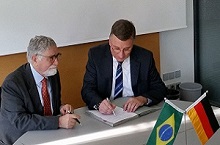News
FAPESP signs agreement with Europe's largest applied research organization Versão em português
 Collaboration with Fraunhofer-Gesellschaft was formalized during a visit by the FAPESP board of directors to the headquarters of the German institution in Munich (Lafer and Treppe during the agreement's signing / photo: Karina Toledo)
Collaboration with Fraunhofer-Gesellschaft was formalized during a visit by the FAPESP board of directors to the headquarters of the German institution in Munich (Lafer and Treppe during the agreement's signing / photo: Karina Toledo)
On Tuesday (10/14) FAPESP signed a science and technology cooperation agreement with Fraunhofer-Gesellschaft, Europe’s largest organization for applied research, in Munich, Germany.
The document was signed by Celso Lafer, FAPESP president, and Frank Treppe, director of the Division of Corporate Strategy and International Relations at Fraunhofer during a visit by the delegation from the São Paulo Foundation. According to the text, collaborative efforts will focus on innovation-oriented applied research, of direct interest to Brazilian and German industry.
The meeting was held in parallel to activities related to FAPESP Week Munich, the symposium sponsored by FAPESP and the Bavarian University Center for Latin America (BayLAT), October 15-17, 2014.
"This agreement is part of FAPESP’s internationalization effort. We are very interested in promoting collaboration with Germany and are aware of the significance of Fraunhofer’s work in terms of applied science. FAPESP’s mission is to support basic as well as applied research in all fields of knowledge,” Lafer emphasized at the start of the visit.
Also in attendance from FAPESP were José Arana Varela, chief executive officer, Carlos Henrique de Brito Cruz, scientific director, Euclides Mesquita Neto, engineering coordinator, and Marilda Bottesi, special advisor for institutional and international affairs.
After welcoming the delegation, Treppe presented an overview of the activities conducted by Fraunhofer, which has more than 80 research units, including 60 Fraunhofer Institutes in Germany.
The institution also has centers for innovation in Brazil, one aimed at research in the field of software and systems engineering in partnership with the Federal University of Bahia (UFBA), and another in the field of food engineering and bioresources in partnership with the Institute of Food Technology (ITAL) of Campinas. The presentation about Fraunhofer in Brazil was given by Peter Eisner, head of the Institute for Process Engineering and Packaging IVV.
According to Treppe, most of the institution’s resources come from service contracts, either with industry or with public administration. Fraunhofer, a private non-profit organization, also receives resources from the German federal and state governments.
"Fraunhofer is the preferred partner for German industry and we work with approximately 6,000 companies a year, mostly small and medium-sized. Our mission is to provide research services and support to innovation in practically all fields related to applications," he said.
Although Fraunhofer’s focus is applied science, Treppe noted, the institution maintains direct links with academia and invests close to one third of its budget in basic research.
"If we want to have something innovative to offer industry, if we want to be at the forefront of what industry is doing, we need to engage in basic research and maintain a network of university collaboration,” Treppe said.
In an interview with Agência FAPESP, Treppe said that there was great potential for collaboration with São Paulo researchers in fields such as foods, biotechnology, bioengineering, production technology, and mechanical and software engineering.
"We already have some active centers in Brazil and a strong local partnership. FAPESP can expand this collaboration by encouraging regional companies to finance their innovation through collaborative projects with universities,” he said.
According to Brito Cruz, the visit was important for obtaining a better understanding of Fraunhofer’s structure and operations and getting a sense of how much the institution values basic research.
"Basic research offers the institution the ability to carry out innovative projects that really interest the industries and governments they are associated with. In São Paulo, we are seeing this type of initiative being carried out by Fraunhofer and we have high expectations with regard to this collaboration,” he said.
New partnerships
For the purpose of exploring future opportunities for collaboration, on Tuesday morning, the FAPESP Board visited the Technical University of Munich (TUM), one of the leading universities in Europe and member of "The Excellence Initiative" program established by the German federal government to promote cutting-edge research, set up excellent conditions for German university studies and strengthen international cooperation.
Leader in the field of technology, the institution has close to 500 professors, 10,000 employees and 36,000 students, most dedicated to programs in engineering, particularly mechanical engineering. The institution has already seen 13 winners of the Nobel Prize and 15 winners of the Leibniz Prize, Germany’s highest scientific award, pass through its doors.
In addition to the delegation from FAPESP, meeting participants included Wolfgang Herrmann, TUM president, Hana Milanov, senior vice-president of international alliances, Thomas Hofmann, senior vice-president of research and innovation, Ana Santos Kühn, director of the TUM International Center, and Alice Becker, project manager of TUM ForTe, Office for Research and Innovation.
Also in attendance were Sören Metz, who oversees the university office for Latin America in São Paulo, Vanessa Grünhagen, Latin America representative of the TUM International Center, Lorenz Wagner, academic coordinator of the Consulate General of Brazil in Munich, and Irma de Melo-Reiners, chief executive of BayLAT.
Hofmann said he had become interested in the FAPESP financing model, mainly due to the flexibility it offers researchers.
"Interested parties can submit their proposals any time over the course of the year. It’s completely open, like the DFG model (German Research Foundation), which is great. I believe we will have many mutual interests, such as those in the fields of energy, biotechnology, medicine and life sciences,” he said.
